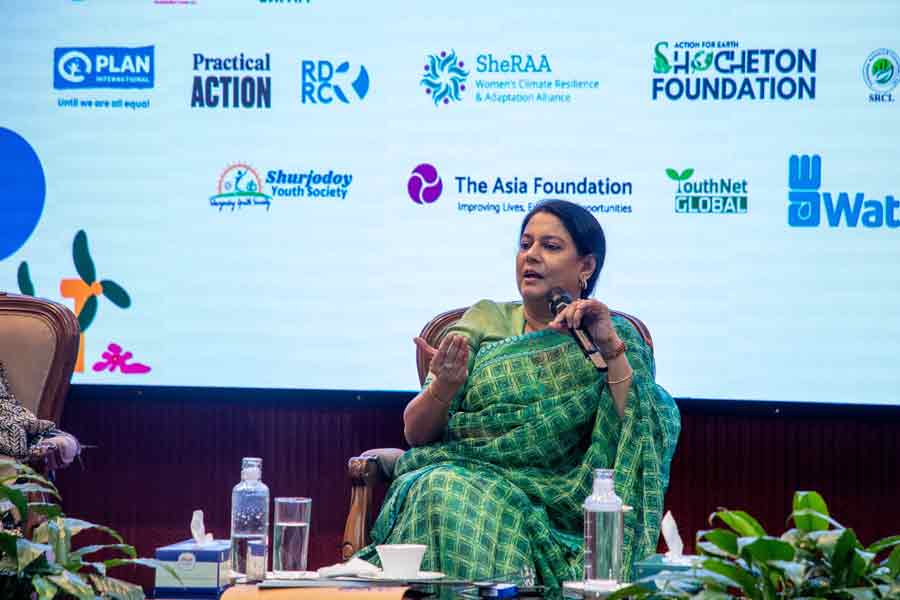Global commitments on climate finance must be fulfilled: Rizwana

Published :
Updated :

Ensuring climate justice requires Bangladesh to revisit its development vision by prioritising mitigation and transforming unsustainable patterns of consumption, said Syeda Rizwana Hasan, Advisor to the Ministry of Environment, Forest and Climate Change, and the Ministry of Water Resources.
She emphasised that the government must play a bolder political role, stating, “The global commitments on climate finance must be fulfilled. If developed countries fail to enhance their contributions to climate action, the survival of climate-vulnerable nations like ours will be at stake. Bangladesh must take a stronger stance on the question of climate justice.”
She was speaking as the Chief Guest at the event titled “People-led Policy: Bangladesh Position at COP30”, held on Tuesday at the Department of Environment Auditorium in Agargaon, Dhaka, according to a press release.
To amplify the voices of climate-affected communities in global climate negotiations, a collective Civil Society Organisations (CSO) Position Paper for Bangladesh, ahead of the upcoming COP30 in Belém, Brazil, was released at the event. The position paper reflects the key demands and strategic priorities of the grassroots communities to be presented at the United Nations Climate Change Conference of the Parties (COP30).
Welcoming the CSO initiative, Advisor Syeda Rizwana Hasan highlighted the importance of a coordinated stance in climate diplomacy. She remarked, “The losses caused by climate change cannot be compensated merely with money. No amount of finance can restore our eroded rivers, lost biodiversity, or human security. Environmental and climate risks must be placed at the centre of all development planning.”
She further added, “If we fail to embed climate justice within our development vision and decision-making today, the next generation will face a dire reality where economic growth will no longer be humane or sustainable.”
Developed through extensive sub-national consultations with affected communities, the Bangladesh Position Paper represents the voices of people from the country’s most climate-vulnerable regions. It has been jointly prepared by 35 national and international organisations, placing climate justice as its core principle.
During the opening discussion, participants emphasised the need to make the Loss and Damage Fund operational and directly accessible for climate-affected women, children, and marginalised communities, avoiding bureaucratic delays. They also called for the recognition of non-economic losses—including cultural heritage, natural resources, and public health—alongside economic damages.
Speakers stressed that wealthy nations must keep their emission reduction commitments, ensure fairness in energy transition, and place gender equality and youth leadership at the heart of climate decision-making. They also echoed global civil society’s call for the inclusion of the “Belém Action Mechanism for a Global Just Transition (BAM)” within the UN climate framework to promote a just global transition.
Speaking at the event, Farah Kabir, Country Director of ActionAid Bangladesh, said the position paper aims not only to guide policy but also to ensure that the voices of the most climate-affected people of Bangladesh are heard in global negotiations.
“Women and children in marginalised communities bear the heaviest burden of the climate crisis. Gender equality and women’s empowerment must be central to all climate policies. Our position paper reinforces that gender equality, youth leadership, and social inclusion can no longer be sidelined in climate decision-making,” she said.
Dr. S.M. Munjurul Hannan Khan, Executive Director of Nature Conservation Management (NACOM), discussed the strategic role of Article 6 of the Paris Agreement, noting, “Article 6 can serve as a powerful mechanism for financing, technology transfer, and capacity building. By leveraging the potential of carbon markets, we can strengthen climate finance flows and enhance the leadership position of climate-vulnerable countries.”
The session was chaired by Dr. Md. Sohrab Ali, Additional Director General, Department of Environment, with Shawkat Ali Mirza, Director, Department of Environment, as the Special Guest. Both appreciated the CSO-led initiative as an important step towards policy coherence between civil society and government efforts in climate governance.
Key presentations were delivered by Roufa Khanum, Assistant Director, Centre for Climate Change and Environmental Research (C3ER), BRAC University; Abul Kalam Azad, Just Energy Transition Manager, ActionAid Bangladesh; M. Mofazzal Hossain, Research Associate, Change Initiative; Afsari Begum, Programme Manager, Concern Worldwide; and Sadia Akter, Associate Trainer.
The event was attended by government officials, development partners, researchers, young climate activists, and Journalists.


 For all latest news, follow The Financial Express Google News channel.
For all latest news, follow The Financial Express Google News channel.